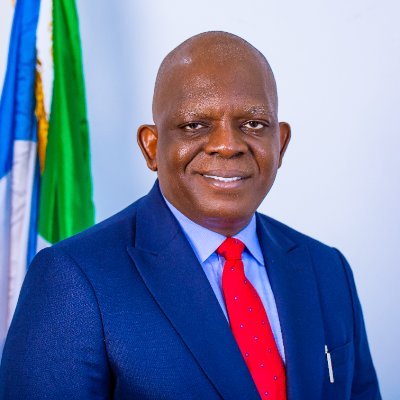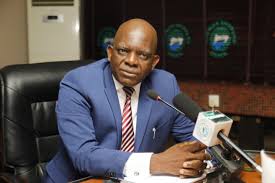Recently, the Executive Secretary of the Nigerian Shippers’ Council; Barrister Pius Ukeyima Akutah met with maritime industry stakeholders; including the media, to highlight his achievements within one year of his appointment. Shipping Position Daily newspaper was there. We serve you some take-ways from the interaction.

Compensation laws in maritime transactions?
Compensation usually is a function of an agreement. If you sign an agreement with someone for whatever it is, these agreements will have terms. And where there is any failure that is not your fault, you can go back to those agreements to be able to settle those disputes. That can be one of the disputes in an agreement for which you can follow the clauses and the provisions to be able to resolve it. This again is very crucial. When you want to go into any transaction, you must have a transaction advisor. You must have legal counsel to guide you appropriately, except if it’s something that has to do with a function of lawmaking.
What is the update on the Inland Dry Ports and the current status of their development?
Yes, we were able to meet up with our KPI as signed under the performance bond with the Ministry of Marine and Blue Economy in the completion and inauguration of the Funtua Inland Dry within time. Now, shortly after the inauguration of the Inland Dry Port in Funtua, the Minister of Marine and Blue Economy mandated us to, within the year in focus, ensure that we also take steps in completing the other inland dry ports. But as at the time this was done, various IDPs, like Isiala Ngwa (Abia state) that you mentioned, and many others, were at different degrees of completion. None of them was above 10%, unless some other ones like the one in Jos, which had started. The one in Borno, which you also mentioned, hadn’t started. But there was another private arrangement for a new investor to work together with the concessionaire to start that in a different location, because the location where the land was awarded is still within the control of insurgents. So, it will not be possible for that to go on. Within the last one year, we have visited almost all the IDPs that are pending, including the one of Isiala Ngwa. And we’ve had a series of meetings with the respective Governors of these states to discuss the state of these inland dry ports.
Concerning the one in Borno, the governor even visited the Nigerian Shippers’ Council, and we had an interaction with him in that regard. He has promised to swing into action and he gave us a deadline within which he could complete the inland dry port. If the two parties are able to consummate an agreement, we bring them together to work in a partnership. So that is ongoing. We have a series of discussions ongoing. concerning the one in Kano, we also visited Kano. We were at the inland dry port, both the one of Kano and Kaduna. We were there to strengthen the work that they are doing, to give them the needed support, to also ensure that we continue to project the presence of those critical maritime infrastructures in the hinterlands for people who are treading around those areas to use them, so that they become efficient.
We also try to look into the problems of cargo moving directly from ports of origin straight to the inland dry ports as destination ports. And we say that one of the challenges is the liability regime under the carriage of goods by land, which we are already working on a bill before the National Assembly to establish that liability regime, so that bills of lading can establish any of those inland dry ports as ports of origin or ports of destination for the purpose of decongesting the seaports, as it were.
Update on the International Cargo Tracking Note implementation and what progress has been made
You will recall that last week, just last week here, we had an investigative hearing at the National Assembly; the House of Representatives. We had an investigative hearing on why we have not implemented that. And that investigative hearing is ongoing. But the Minister of Marine and Blue Economy, since assumption of office, acknowledges the importance of the ICTN and is doing everything possible to ensure the quick implementation of the ICTN. Just because we have not gotten there yet, seems like nothing has been done. But a lot has been done behind the scenes. You will recall that there are some cases pending in court also in the last attempt to implement the ICTN, which falls short of some expectations, because of some vested interests. We were not able to implement them at that time. Different contracts were awarded by the past regime and cancelled, which resulted in some court cases that are pending in court. But the Minister of Marine and Blue Economy is working tirelessly with all these stakeholders to see how we can resolve these issues and move to implementation as quickly as possible. We also acknowledge the importance of this to the security architecture. And we are not sleeping over this at all to ensure that it comes to fruition as quickly as possible.
Current status of the concession agreements, especially in relation to their renewal and implementation?
Right now, the concession agreements are going under a review process. Even last week, the Ministry of Justice, together with the Ministry of Marine and Blue Economy, and the Nigerian Shippers’ Council met here in Lagos to look at the review process. We are almost at the end stage of the review process, after which we forward all of that to the Ministry of Marine and Blue Economy for onward transmission to the Presidency for all the discussions that will follow, before we can now get into the renewal processes. Those agreements, you understand that many of them, many of the concession agreements did not even take effect after they were signed because of some challenges here and there. We want to be able to make those agreements very watertight now, so that anyone who is having the concession agreements, we have to follow clearly what is set out in those agreements. For anyone who signed them, we have to implement them to the full, and we also have a mechanism to monitor the implementation and all that. We are doing something about that.
Can you elaborate on the issue of container deposits and the challenges exporters and shipping companies are facing in this regard?
You will also recall that these containers are part of the total shipping infrastructure that supports movement of goods around the world, and the cost of constructing those containers, you will understand, is very huge. For the shipping companies who own this infrastructure, that has been the way of ensuring that those containers get back to them after the exporters use them. It has been a big challenge, and we understand all the problems associated with it, the refund of the deposit, the non-refund of the deposit, all sorts of things. Before I came in, the Federal Executive Council had already looked into this and had approved a certain company that presented a measure to correct this. And rather than having a container deposit, there will be a regime of container insurance so that there will be a ‘Know Your Customer’(KYC). Every customer in the sector will be profiled so that when you go with a container, which is actually an infrastructure belonging to the shipping company, you ensure that you return them to the owners of the containers. We are working together to see how we can overcome this container deposit issue.
How is the Nigerian Shippers’ Council working to address inefficiencies at the ports and improve overall performance?
We are working with the terminal operators in terms of ensuring the efficiency of the systems. We talked about innovations. We talked about ICT compliance, and many of them are compliant with those innovations to ensure efficiency. The issue of cost; we are not able to achieve a reduction in cost at the moment, but we are looking at cost overall, and that’s why you will see that in the last few months, we have not talked about the increments in any of the charges or fees. We are trying to see how we can balance the cost of services across the sector in a way that we will not shoot-out the cost and slow the economy down to the lowest. Everybody is facing the brunt of the cost, which is associated with the fluctuations in Naira and dollar. But we will continue to work on the efficiencies of the port, and I guarantee you that within the next one year, a lot of improvements will be out there.
How is the Nigerian Shippers’ Council handling labour-related challenges in the maritime sector, including the potential of port shutdowns?
Since I came in, I think one of the major things that have happened to me is to have a very responsible leadership of the Maritime Workers Union of Nigeria; that does not believe in economic sabotage, but believes in continuous engagement with stakeholders to see how we can better the sector. I don’t think that the President General of the union is about shutting down the ports and creating issues in the sector that slow down the economy from moving and all that. At the Shippers Council, we believe in continuous engagement with the labour unions to see how we can resolve any disputes that may arise without getting to the point where the ports will be shut down. I remember the last time that the NLC called for a nationwide strike, and everywhere was shut down. I know that the ports were the first to open, and that was a courtesy of the union’s President General, who at that point determined that it would not be in the interest of the country’s economy to continue to shut down the country. So that is the magnanimity within which he is running the union.
Can you comment on the efforts to reduce dollar-denominated charges for port services?
We’re actively working on this. A directive has been given to move toward naira-based transactions, though it’s a gradual process due to international service requirements. This transition will ease currency pressures and improve economic stability. All agencies are committed to making this a reality.















